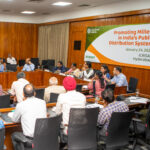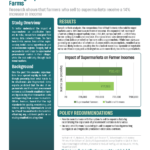Tag: Prabhu Pingali

Addressing Information and Credit Barriers to Making India Open Defecation Free and Improving Child Health: Evidence from a Cluster Randomized Trial in Rural India
Abstract Read a policy brief based on this study. Background Open defecation (OD) remains a significant public health challenge in India, contributing to adverse child health outcomes. Eliminating OD and improving child health necessitates both universal access and adoption of toilets. Despite the success of...

These Are the Keys to Promoting Artificial Insemination for Livestock
With the world’s population growing and dietary preferences changing, rising demand for animal-based food products like milk presents an opportunity for farmers in the developing world. Artificial insemination can help these farmers improve their productivity and increase their incomes, so…

Understanding the Determinants of Farmers’ Adoption of Artificial Insemination in Livestock
Abstract Read a policy brief based on this study. The adoption of artificial insemination (AI) in livestock is a crucial factor in enhancing breeding efficiency, livestock productivity, and income opportunities for farmers. However, the adoption of AI among farmers can vary significantly, influenced by a...

Smart Foods for Smarter Policies: Millets in India’s Public Distribution System
As India intensifies efforts to fight hunger and malnutrition, the Tata-Cornell Institute for Agriculture and Nutrition (TCI) and the International Crops Research Institute for the Semi-Arid Tropics (ICRISAT) are helping Indian policymakers with evidence-based strategies to include millet in the…

Chhattisgarh Can Reduce Ag Emissions Through Diversification
India has made enormous progress against hunger by incentivizing the production of staple grains like rice and wheat. Yet, as climate change advances, the country’s dependence on rice is becoming a burden due both to its large environmental footprint and…

Making Supermarkets Profitable for India’s Small Farms
This policy brief presents the results of a study examining the impact of supermarkets on smallholder farmers in India. Using field survey data collected from 795 farm households across four states representing India’s varied agroclimatic and socioeconomic regions, researchers found that farmers who sold to...

TCI Publishes 2023–24 Annual Report
The Tata-Cornell Institute for Agriculture and Nutrition (TCI) has published its 2023–24 Annual Report.
The report offers an in-depth look at the full range of TCI’s research and other activities, including projects like Zero-Hunger, Zero-Carbon Food Systems, and field research…

Do Supermarkets Help India’s Small Farmers? It Depends.
When supermarkets first began spreading across India, they brought hope that smallholder farmers could make more money by selling them fresh, high-quality produce. Decades later, has that benefit materialized?
New research from the Tata-Cornell Institute for Agriculture and Nutrition (TCI)…

Determinants and Income Effects of Small Farmers Selling to Supermarkets versus Traditional Market Channels in Four Regions of India
Abstract Read a policy brief based on this study. Using endogenous switching regressions to calculate transitional heterogeneity which we have used to build counterfactual scenarios to identify the treatment effects for both sellers to supermarkets and sellers to traditional markets, the results support neither a...

Transitions to Crop Residue Burning Have Multiple Antecedents in Eastern India
Abstract Far removed from the agricultural fire “hotspots” of Northwestern India, rice residue burning is on the rise in Eastern India with implications for regional air quality and agricultural sustainability. The underlying drivers contributing to the increase in burning have been linked to the adoption...

